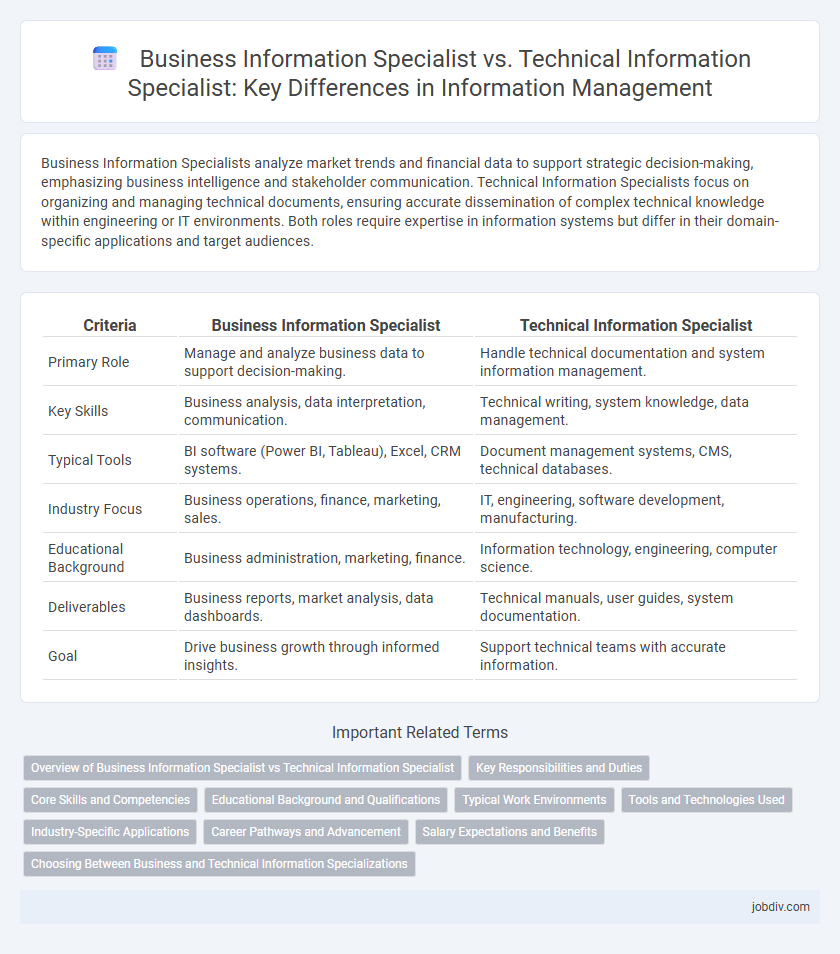Business Information Specialists analyze market trends and financial data to support strategic decision-making, emphasizing business intelligence and stakeholder communication. Technical Information Specialists focus on organizing and managing technical documents, ensuring accurate dissemination of complex technical knowledge within engineering or IT environments. Both roles require expertise in information systems but differ in their domain-specific applications and target audiences.
Table of Comparison
| Criteria | Business Information Specialist | Technical Information Specialist |
|---|---|---|
| Primary Role | Manage and analyze business data to support decision-making. | Handle technical documentation and system information management. |
| Key Skills | Business analysis, data interpretation, communication. | Technical writing, system knowledge, data management. |
| Typical Tools | BI software (Power BI, Tableau), Excel, CRM systems. | Document management systems, CMS, technical databases. |
| Industry Focus | Business operations, finance, marketing, sales. | IT, engineering, software development, manufacturing. |
| Educational Background | Business administration, marketing, finance. | Information technology, engineering, computer science. |
| Deliverables | Business reports, market analysis, data dashboards. | Technical manuals, user guides, system documentation. |
| Goal | Drive business growth through informed insights. | Support technical teams with accurate information. |
Overview of Business Information Specialist vs Technical Information Specialist
Business Information Specialists focus on managing, analyzing, and interpreting data to support strategic decision-making within organizations, often emphasizing market trends, customer insights, and competitive intelligence. Technical Information Specialists concentrate on organizing and maintaining technical documentation, product manuals, and engineering data to facilitate effective communication and knowledge sharing among technical teams. Both roles require expertise in information management but differ in their focus areas and the type of information handled.
Key Responsibilities and Duties
Business Information Specialists gather, analyze, and interpret market trends, financial reports, and customer data to support strategic decision-making and enhance business operations. Technical Information Specialists manage, organize, and maintain technical documents, databases, and digital content, ensuring accurate and efficient access for engineering, IT, and research teams. Both roles require strong data management skills but differ in focus, with Business Specialists emphasizing business intelligence and Technical Specialists focusing on technical documentation and information systems.
Core Skills and Competencies
Business Information Specialists excel in data analysis, strategic communication, and market research, enabling them to translate complex information into actionable business insights. Technical Information Specialists possess strong expertise in information systems, database management, and technical documentation, ensuring accurate and efficient handling of technical data. Both roles require critical thinking and problem-solving skills, but the Business Information Specialist emphasizes business acumen while the Technical Information Specialist focuses on technical proficiency.
Educational Background and Qualifications
Business Information Specialists typically hold degrees in Business Administration, Information Systems, or Library Science, often complemented by certifications such as Certified Information Professional (CIP) or Project Management Professional (PMP). Technical Information Specialists usually possess educational backgrounds in Computer Science, Information Technology, or Engineering, with qualifications including certifications like CompTIA Network+, Cisco Certified Network Associate (CCNA), or Microsoft Certified: Azure Fundamentals. Both roles require strong analytical skills, but Business Information Specialists emphasize management and strategic decision-making, while Technical Information Specialists focus on technical documentation and systems integration.
Typical Work Environments
Business Information Specialists typically work in corporate offices, consulting firms, or government agencies where they analyze market trends and manage strategic data. Technical Information Specialists are often found in technology companies, research labs, or engineering firms, focusing on organizing and maintaining technical documentation and databases. Both roles require collaboration within interdisciplinary teams but differ significantly in their workplace settings and primary data focus.
Tools and Technologies Used
Business Information Specialists primarily utilize data analytics platforms like Tableau, Power BI, and SQL for processing and interpreting business data, aiding in decision-making processes. Technical Information Specialists focus on employing advanced tools such as database management systems (Oracle, MySQL), content management systems (CMS), and programming languages (Python, Java) to manage and optimize technical information workflows. Both roles demand proficiency in information retrieval systems, but their toolsets diverge to meet specific business or technical information requirements efficiently.
Industry-Specific Applications
Business Information Specialists excel in leveraging industry-specific data analytics tools to optimize market strategies within sectors such as finance, healthcare, and retail. Technical Information Specialists focus on the integration and management of proprietary technologies and software systems tailored for industries like manufacturing, telecommunications, and software development. Both roles demand expertise in domain-specific databases, regulatory compliance standards, and customized information workflows to support organizational goals.
Career Pathways and Advancement
Business Information Specialists typically advance through roles in data analysis, project management, and strategic planning within corporate environments, leveraging skills in business intelligence and stakeholder communication. Technical Information Specialists focus on careers in IT support, software documentation, and systems analysis, progressing by enhancing technical expertise and certifications such as CompTIA or Cisco. Both career pathways offer growth opportunities through specialization and leadership roles, but the Business Information Specialist often moves toward management, whereas the Technical Information Specialist advances through technical mastery and innovation.
Salary Expectations and Benefits
Business Information Specialists typically earn an average salary ranging from $60,000 to $85,000 annually, with benefits that often include health insurance, retirement plans, and performance bonuses. Technical Information Specialists command higher salaries, generally between $75,000 and $110,000, reflecting their advanced technical expertise and often receive comprehensive benefits such as stock options, professional development funds, and enhanced healthcare packages. Salary expectations vary based on experience, industry, and geographic location, with technical roles offering more lucrative compensation due to specialized skill demands.
Choosing Between Business and Technical Information Specializations
Choosing between a Business Information Specialist and a Technical Information Specialist depends on career goals and skills alignment. Business Information Specialists focus on data analysis, market trends, and strategic decision support, ideal for those skilled in business operations and communication. Technical Information Specialists excel in managing complex technical data, documentation, and IT systems, suited for professionals with strong technical expertise and problem-solving abilities.
Business Information Specialist vs Technical Information Specialist Infographic

 jobdiv.com
jobdiv.com